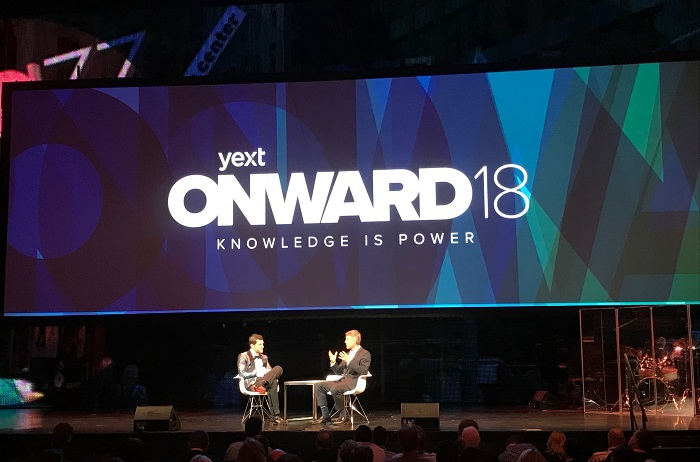Digital knowledge management platform Yext (NYSE: YEXT) unveiled a new suite of products at its ONWARD 2018 conference Tuesday, aiming to help companies manage business data as “conversational” tech becomes a more prominent commodity.
Yext Brain sits at the crux of the service, offering a simpler way for companies to organize data and frame it within contextual relationships to form more cohesive front-facing web experiences. On the backend, businesses can use data to fill preloaded entities like “events,” “locations,” and “professionals,” or create custom entities of their own. Once created, these entities can be mapped together to form more complex data relationships. These data sets can then be easily search by third-party entities, like search engines, or chatbots.
Yext AI Pages, the newest addition to the Yext Pages offering, allows businesses to translate and apply data relationships directly to the user experience. Businesses can build landing pages using digital entities stored within Yext Brain. Changes to existing information is also updated across all pages automatically, eliminating the need for tedious manual revision.
“Yext Brain allows any business to create digital entities like locations, events, people, and products, and connect them like synapses in a brain,” Marc Ferrentino, chief strategy officer, Yext, said in a statement.
The goal is to provide users with an easier way to find the information they need, in a more conversational manner. Yext Think aims to help businesses build smarter conversational search using long-tail queries without the need for filtering results.
On the backend, businesses can build what Yext refers to as “experiences,” or different types of searches the company believes customers will be looking for when they visit their website, or on third-party search engines, like Siri, Google, and Amazon Alexa. Instead of focusing on one or two major keywords, Yext Think lets marketers build more complex, question-based search queries using assets built in Yext Brain.
At ONWARD ‘18, Yext used searching for a doctor as an example. Traditionally, user experience requires patients to search via specific keywords (like doctor, New York City, etc.) and then filter through results until they find the exact match. With Yext Think, users can type (or say) something like “I’m looking for a foot doctor in New York City that takes Aetna,” and retrieve more focused results in a shorter period of time.
Related: Do You Need A Voice Search Strategy? Probaby.
Yext Think also collects analytics on user search queries, so companies can identify and fill gaps in their data that customers may be searching for. Once gaps are identified, Yext works to fill in those gaps, and the information is automatically updated across every entity existing within the Yext Brain.
The result is a data environment where businesses can build new assets, optimize existing assets, and improve user experience under one umbrella.
“No more guessing, no more reading, no more thinking,” Howard Lerman, Yext founder & CEO, said in a statement. “A website makes you do the thinking. A Brain thinks for you.”








